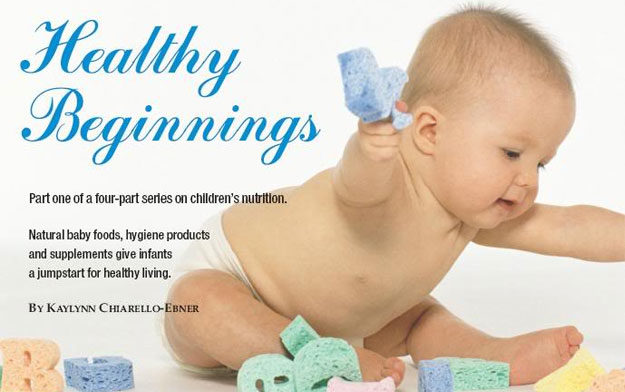When parents come strolling a little one through your store's front door, give them a hearty "Welcome to Parenthood" by pointing them to your natural baby care supplies. This section will surely be a growing area for your store in more ways than one. Concerns about ingredient quality, skin sensitivity, environmentalism and good nutrition are spurring more and more parents to pass up synthetics and purchase natural baby care products.
Swaddled in Good Nutrition
While much of it may end up on their faces (or their bibs…or their hands…or your hands!), the foods that parents attempt to land in their babies' mouths should be carefully selected. "Whether it's children or adults, the most important thing is a balanced diet," stresses Jodi Drexler Billet, vice president of Country Life Vitamins, Hauppauge, NY. "Getting vitamins and nutrients through diet is especially important for babies."
Once babies are ready to dig into their first fruits and vegetables, parents should understand the importance of selecting all-natural and/or organic baby foods. "Pound for pound, babies consume two to four times more fruits and vegetables than adults, thereby exposing them to a higher portion of contaminants," says Kim Bremer, director for infant feeding at Earth's Best, Boulder, CO. "Because their appetites are so small, it is that much more important to ensure that each mouthful is full of maximum nutrition."
Bremer notes that organic infant foods (such as her company's) are formulated to eliminate unnecessary ingredients like salt, modified starches or refined sugars so as to be as nutritious as possible.
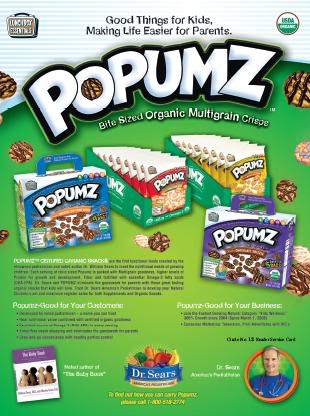 The same holds true for drinks, says Roberta Greenspan, CEO and founder of Maddie's Beverage Company, Belmont, CA. She offers an example to stress the point: "Drinking just three juice boxes a week every week for a year contributes 8.5 lbs of sugar and 15,000 calories to a child's diet.
The same holds true for drinks, says Roberta Greenspan, CEO and founder of Maddie's Beverage Company, Belmont, CA. She offers an example to stress the point: "Drinking just three juice boxes a week every week for a year contributes 8.5 lbs of sugar and 15,000 calories to a child's diet.
With the rising epidemic of childhood obesity, diabetes and tooth decay linked to the consumption of sugar-laden beverages, it's incredibly important that parents take the time to read the label when considering beverage choices for this age group."
She adds that parents shouldn't be fooled by the "no added sugar" or "no calories" language because it doesn't necessarily mean it's healthy. "Even if a beverage's name implies certain health benefits, parents still need to look for the presence of such things as artificial sweeteners like sucralose and aspartame, preservatives like potassium benzoate and potassium sorbate, and artificial colorings like Red #40 or Blue #1."
Greenspan hits on an a vital point that will be fully flushed out in part four of this series (October 2009). Certain artificial colors and sweeteners have been linked to hyperactivity and attention deficit disorders in children. Though they have been banned elsewhere, the United States has not yet done so—despite petitions from informed parents.
In response to consumer interest in products that are void of synthetic colors and flavors, she cites a new trend in children's nutrition: juice alternatives. "[Such beverages] are lower in sugar and calories than existing juice products (100% or otherwise) and, hence, are perceived as healthier," says Greenspan. An example is her company's flavored boxed water for youngsters.
Spoon-Fed Nutrition. Baby food experts interviewed for this article suggest that parents be on the lookout for these important nutrients when selecting formulas, cereals and baby foods:
- Wholesome organic ingredients with fiber like whole grains and fruits. According to Bremer, the whole grains used in her company's baby foods "are naturally rich in minerals, vitamins and fiber compared to those that are refined. Each of our fruit and grain combinations include one to three grams of fiber per serving."
-
 Vitamins A and C from fruits and vegetables for "antioxidant power," says Bremer. Zinc, along with these and other nutrients, will help support a healthy immune system.
Vitamins A and C from fruits and vegetables for "antioxidant power," says Bremer. Zinc, along with these and other nutrients, will help support a healthy immune system. - When ready for more complex foods, high-quality meat-derived products give babies the protein they need. Companies also are using high-protein vegetarian sources like lentils, chickpeas and quinoa.
- Healthy fats (like DHA from algae or fish) and arachidonic acid support proper brain and eye development.
- Bone-building staples calcium and vitamin D support bone health.
Jeff Pillet-Shore, a brand manager for Stonyfield Farm (maker of YoBaby), Londonderry, NH, notes the importance of foods that integrate probiotics. "More and more parents understand this, though it's still a way's away from being something that everyone clearly gets," he says. "It's getting more familiar and better understood [by the average consumer] as new product launches are raising that level of awareness."
He points out that many shoppers in the natural products channel already understand the digestive and immune health benefits of probiotics. As for which strains they should select for babies, Pillet-Shore explains that his company uses a proprietary blend of six live probiotic cultures including Lactobacillus rhamnosus, L. acidophilus, Bifidus and L. casei. The L. rhamnosus strain, he says, "is known to support and enhance digestion in a good way. In contrast to other strains of other probiotics that are designed to overcome obstacles, that's not exactly what you're looking for your baby."
No More Puckers. Anyone who has seen that wrinkled baby-face squirm during meal times knows that babies won't eat just anything. According to Kalpna Solanki, president of BoboBaby of Burnaby, BC, Canada, the preparation can make all the difference. Freezing baby foods rather than jarring them, she believes, will give you a better-tasting product. "When I'm asked, ‘Why frozen and not jarred?' I usually ask, ‘Do you buy frozen or canned peas?' They usually say ‘Frozen, because it tastes better and it's fresher…it's the same with baby foods."
The frozen baby food trend seems to be catching on as the market has expanded in recent years with the offerings of BoboBaby, Plum Organics, Happy Baby, Mom Made and others. Homemade Baby is one of several companies making cups of refrigerated baby foods that are organic and gluten free. It should be noted, however, that many parents appreciate the convenience and portability of jarred foods.
Jarred and frozen baby food companies alike are, experimenting, with flavor and spice combinations to keep babies' and toddlers' mouths happy. Says Solanki, "Quite quickly, babies' progress to needing or wanting a wider variety to develop their palates."
Companies are running with this idea. While the first solid foods introduced at six months are simple, single-ingredient foods, food makers are being more creative at seven through nine months. Examples of unique food combinations include Earth's Best Organic Seasonal Harvest (Sweet Potato Cinnamon, Green Bean Casserole, Pumpkin Apple and Apple Turkey Cranberry) as well as BoboBaby's Chickpeas and Tomato Provence, and Pear with Quinoa and Ginger. Homemade Baby even has a Tex Mex variety for children older than 12 months.
In addition to new flavors, Solanki notes the benefit of giving babies foods that have more texture than pureed varieties. "When we worked with our nutritional consultant in developing our line, that was one of the things we were told….Baby foods should start getting chunkier at seven months onward, otherwise you get into a situation where you have a two-year-old child that still wants pureed foods because they're not used to texture," she feels.
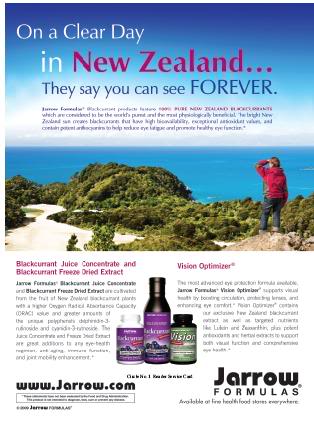 First Steps for Supplementation
First Steps for Supplementation
While it's best for a baby's nutrition to come from food sources, there may be some nutritional gaps that supplementation can help address (once approved by a pediatrician). "Supplements are a form of insurance, a guarantee that the baby is getting adequate levels of the essential nutrients in the supplement," says James Gibbons, president of Nature's Plus, Melville, NY. "If a mother is certain that her diet is lacking in vitamins and minerals, then she can be sure that her breast milk also will be deficient. For breastfed babies, this leaves dietary supplements as the sole source of some essential nutrients."
Judy Davis, technical services manager at Hero Nutritionals Inc., San Clemente, CA, agrees: "Supplementation differs depending on the nutritional well-being and diet of the mother who is breast feeding."
Take vitamin D, for example. Often, breast milk doesn't have enough of this key nutrient for proper bone development. Says Melissa Wilson, M.S., a product developer at J.R. Carlson Laboratories, Inc., Arlington Heights, IL, "The amount of supplemental vitamin D required for a breastfeeding mother to provide a healthy amount to her infant is unknown. But studies suggest this amount is much higher than what is currently recommended."
Last year, the American Academy of Pediatrics recommended that the government increase the recommended daily intake of the supplement of all breastfed and partially breastfed infants to 400 IU/day of vitamin D beginning right after birth. Bottle-fed babies, says Wilson, often get enough vitamin D from their formula, but they too may benefit from extra vitamin D.
Certain essential fatty acids, like DHA and ARA, also may be appropriate supplements for both bottle-fed and breast-fed babies. These nutrients are said to support healthy brain, nerve and eye development in babies. According to William Sears, M.D., on www.DrSears.com, "Fats can also influence brain development and performance, especially at either end of life—growing infants and elderly people. In fact, there are two windows of time in which the brain is especially sensitive to nutrition: the first two years of life for a growing baby and the last couple decades of life for a senior citizen" (1).
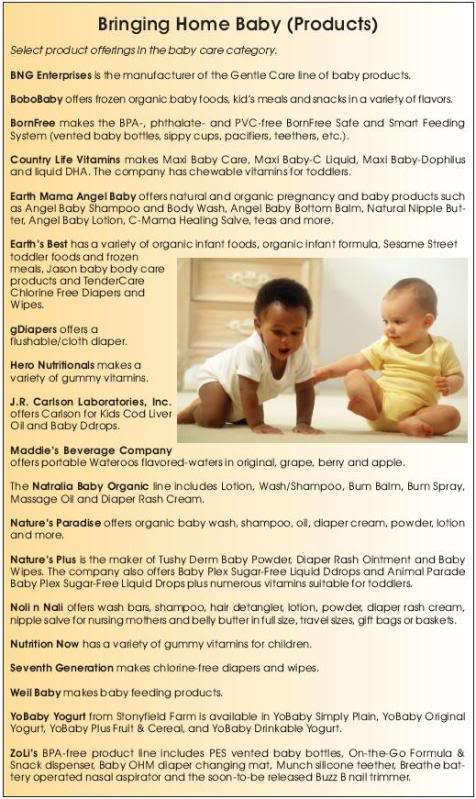 Sears believes the link between DHA and proper brain development is quite clear. Brain growth occurs most rapidly during the first year of life, tripling in size during the first year (1). Says Sears, "During the first year, around 50% of an infant's daily calories come from fat. Mother Nature knows how important fat is for babies; 50% of the calories in mother's milk is fat" (1).
Sears believes the link between DHA and proper brain development is quite clear. Brain growth occurs most rapidly during the first year of life, tripling in size during the first year (1). Says Sears, "During the first year, around 50% of an infant's daily calories come from fat. Mother Nature knows how important fat is for babies; 50% of the calories in mother's milk is fat" (1).
Much research has indicated how beneficial it is for babies and toddlers to have DHA in their diets. In one study, for example, four-month-old infants given omega-3 fatty acids showed improved visual ability. The same study and many others have indicated that babies whose mothers take fish oil have better attention spans and mental development than those whose mothers did not (2). And, recent data indicate that premature babies (especially girls) given high doses of DHA (via formula or breast milk) had better memory, problem solving and language development (see the March 2009 issue of WholeFoods Magazine).
Wilson notes that breast-feeding mothers should take enough DHA for both her and her baby. "The amount of DHA in a mother's breast milk is strongly influenced by the amount of DHA in her diet. Experts recommend that pregnant and lactating women consume a minimum of 200 mg of DHA per day. Dietary DHA may support mental health and mood, which are especially important during the postpartum period. Carlson offers a Mother's DHA supplement which provides 200 mg DHA in two softgels."
Retailers shouldn't assume that women already know this information. According to nutritionist Vicki Koenig, "The average DHA content of breast milk in the United States is among the lowest in the world"(3). And, a 2006 survey indicated that only half of the 500 pregnant and nursing women surveyed knew that DHA omega-3s are important for the baby's development; worse, only 70% of their doctors discussed this nutrient with them (4).
Formula-fed infants and those ready for cereals can benefit from products that incorporate extra DHA. Once children are old enough for gummy, chewable and smoothie forms of DHA, a plethora of high-quality dietary supplements is available from manufacturers such as Barlean's Organic Oils, Solgar, Inc., Nutrition Now, Jarrow Formulas, Nordic Naturals, Carlson Laboratories and Dr. Sears America's Pediatrician.
A host of other nutrients are important too, so Drexler Billet reminds us that supplementation with a good multivitamin is crucial. Using an industry formula as an example (Maxi Baby Care from Country Life Vitamins), such a multivitamin may include important vitamins like A, C, D and E; and the B-complex (thiamin, riboflavin, niacin, pantothenic acid, B6, folic acid and B12).
Other infant supplements (such as NutriStart Multivitamin Powder from Rainbow Light Nutritional Systems) add minerals like calcium, iron, magnesium and zinc.
Kate Jones, vice president of Nutrition Now, Vancouver, WA, adds that supplementation is particularly important as kids grow to have fast-paced lifestyles, making it hard for parents to supervise what they eat every day. "Processed foods, sweet drinks and refined sugars are more available to kids than we think. High-energy diets are often low in essential nutrients such as vitamin C or D, fiber, omega-3s, calcium, etc. and can affect kids' overall digestion, normal growth and immune system," she says.
For babies that need extra immune and digestive support, Drexler Billet suggests a good probiotic "to help keep the good flora in your intestines and stomach walls. It evens it out, especially for children who are building their immune systems."
Probiotics may benefit babies in other ways, too. Colic symptoms decreased by 74% in breast-fed babies that were given 108 colony-forming units of L. reuteri half an hour after eating (5). And, other sources indicate that giving newborns doses of "good bacteria" may help to prevent childhood allergies (6).
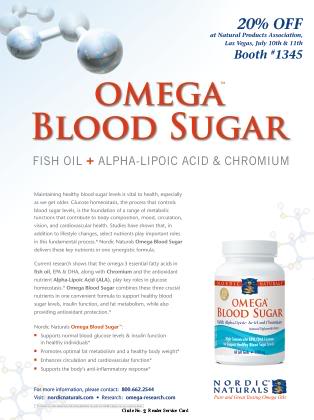 As stated previously, be sure to advise clients to discuss these >supplement options with a pediatrician before starting a nutritional regimen in babies or children.
As stated previously, be sure to advise clients to discuss these >supplement options with a pediatrician before starting a nutritional regimen in babies or children.
Born to Be Green
If you've noticed babies looking a little greener lately, you're onto something. Consumer desire for environmentally friendly products has shaped many aspects of the natural products industry, not the least of which includes baby care.
Says Kenda Haines, CEO and founder of Noli n Nali, Scotts Valley, CA, "As parents, we want the safest products for our children. This has become apparent since organic and natural baby care was reported as being the fastest-growing segment, according to LOHAS…With the baby care segment growing every year, it gives us the opportunity to use our ingenuity and to be active participants in our family's health."
Haines' observation is shared by others interviewed for this article. Indeed, the desire for green baby products has had a positive two-fold effect on our industry: increased sales and creative product development. Julianna Shaw, founder and CEO of ZoLi Inc., Burlingame, CA, agrees and states, "The demand for environmentally sustainable products allows companies to be more innovative in their design and development as they seek alternative materials that are safer and non-toxic."
For example, she notes that eco-friendly baby bottle makers have turned to materials like polyethersulfone (PES) and silicone in lieu of bisphenol-A (BPA). (More on this important issue later in this article.)
The diapers market is another great example where innovation is shining. Some 50 million disposable diapers end up in landfills every day—which may take up to 500 years to decompose (7). Eco-conscious moms and dads are increasingly choosing diapers made with all-natural materials that are better for the environment. One such design from gDiapers has a cotton outer diaper and a strap-in, flushable (or compostable) liner. This diaper hybrid is 100% biodegradable within 60 days and uses natural fibers (like tree-farmed fluff pulp) for absorbability.
Chlorine-free disposable diapers and wipes avoid agents that may cause dioxin pollution. Rather, they are made with "renewable resources such as corn and wheat and contain 20% fewer petrochemicals as compared with regular diapers to reduce babies' environmental footprint," says Bremer with respect to the Earth's Best line.
Baby skincare, too, is in line with this idea. Gibbons explains how DreamQuest Tushy Derm products (baby powder, wipes and diaper rash ointment) were formulated with nature in mind: "While we could have included any of the many cheap synthetic sanitary ingredients available to manufacturers, we decided to rely on such natural ingredients as zinc and cranberry." Whereas the manufacturing of synthetic ingredients from petroleum by-products can harm the environment, says Gibbons, "zinc and cranberry are natural, and their production can actually reduce greenhouse gases."
And, packaging in the baby care market is being overhauled with the environment in mind. Says Shaw, "Companies are looking at the entire product cycle to ensure they are making right choices for the environment. This has led to improved packaging by eliminating unnecessary materials and choosing to be more environmentally responsible through use of recycled papers and non-petroleum–based inks."
For example, YoBaby recently redesigned its packaging to be more eco-friendly. "We looked at the tops for the multipacks and saw that we could use less material. And so, we switched all of our multipacks over to this and in the process, this will save the equivalent of 17,000 pounds of material over the course of a year," says Pillet-Shore.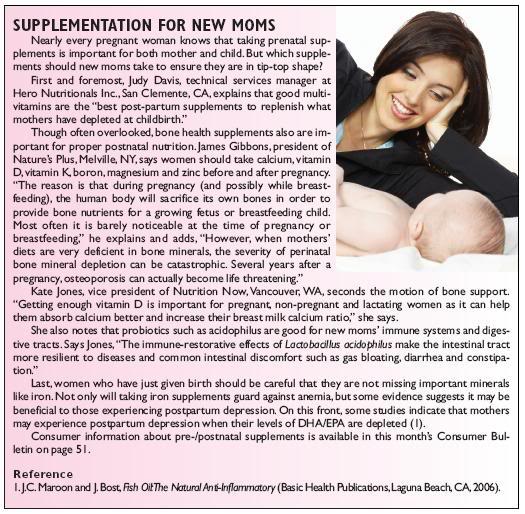
Healthy Beginnings. While green baby products are certainly about environmentalism, it also is a way to reach better personal health. Says Marlene Sirota, president and founder of Dr. Andrew Weil BABY, Lutz, FL, "The more educated consumers become about eco-friendly products, the more in-tune they are to not only their own well being, but also that of their children. Manufacturers of baby care products and accessories recognized that there is a market for these ‘healthier' products."
The skincare segment of the baby category is another prime example. Many parents snatch up the natural varieties because they believe they have less allergens and will be gentler on their babies' sensitive skin. Says Haines, "Our skin is the largest organ of the body, a thin layer of tissue vital to the health of the immune system and baby's skin is much more sensitive than an adult's. This boundary between the environment and us is dynamic. Our skin breathes and expels toxins from the body. One way to reduce exposure to harsh chemicals is to use organic and natural products."
|
Eating Up Allergy Free Some 6% of children younger than three have food allergies or intolerances to foods such as milk, eggs, peanuts, soy, wheat, tree nuts, fish and shellfish (1). Reactions can vary from uncomfortable gastrointestinal pain or skin rashes to the more severe wheezing and fainting. Many pediatricians are careful about advising parents how to introduce potential allergy-inducing foods to children. But, retailers shouldn’t overlook the allergy/intolerance potential in certain supplements that may have lactose, fish, soy or other components. With respect to gluten/wheat allergies, Country Life Vitamins recently became the first company to have a full supplement line that is certified gluten-free. Given the extra steps that are required to achieve gluten-free certification, such certified gluten-free supplements may also be appealing to parents across the board that are looking for high-quality supplements, says Jodi Drexler Billet, the company’s vice president. “It was a six-month process, but it was well worth it…Being gluten free was very important to us as a company…and it ensures the consumer gets the best product.” For more information on gluten-free certified products, visit the Gluten Free Certification Organization at www.gfco.org. Reference 1. “Food Allergies,” www.kidshealth.org, accessed May 19, 2009. |
John Swigert, general manager of Eulactol USA, Boca Raton, FL, seconds this point and adds that many traditional products use paraffin or mineral oil (a by-product in the distillation of petroleum from crude oil). Not only is this an environmental concern, but "over time, these ingredients can be potentially unhealthy for the body."
Studies back up Swigert's and Olson's comments. One recently published article in Pediatrics indicated that phtalates were detected in the urine of babies who were two to 28 months. This synthetic ingredient found in traditional baby powders, lotions and shampoos may absorb through the skin and affect the reproductive system (seeWholeFoodsMagazine, April 2008, p. 9).
Using the Natralia Baby line of lotions, washes and creams as examples, it's clear that nature offers some great alternatives to synthetics. One herb the company uses in its formulas is Centipeda cunninghamii, which Swigert says is "clinically proven to have anti-microbial, anti-inflammatory and cell regeneration properties. It's ability to stimulate growth of human skin cells is also quite remarkable and makes the whole offering so unique." Other key natural ingredients in baby care products include chamomile, mandarin oil, marigold extract, calendula, aloe vera and vitamins A and E.
Haines believes that good options for natural skincare product preservation include gluconolactone and polyhydroxy acid; good emollients, she feels, include evening primrose, citrus oils and other essential oils.
Shoppers should be reminded not to be fooled by traditional companies that greenwash products. "Consumers just need to be aware and seek out products from companies that provide transparency. Companies who provide transparency will indicate the ingredients and/or materials used, so check the labels," Olson says. Retailers can take the lead to warn them to read the ingredient lists—they (and their babies' skin) will thank you.
In a nutshell, retailers who highlight their natural baby care offerings may help consumers lay to rest two major concerns: achieving environmental responsibility and excellent baby care. The latter is particularly relevant to today's shopper, given the children's products that recently faced safety scandals (such as lead in children's toys and trace amounts of melamine found in Enfamil and in Nestle's Good Start baby formula). Says Olson, "We've also witnessed an industry-wide shake up as some of the more historically venerated brands of baby care products have now been found to contain carcinogens." This has helped the natural and organic baby care channel grow. "Choosing organic products is now less of a quaint, optional choice than a fundamental safety issue…Peace of mind is a much bigger issue now when choosing a brand of products, and brand loyalty has increased greatly, in our experience as a company," she says.
The ABCs of BPA
For decades, companies have been using BPA to make clear, shatter-proof plastics that are seemingly perfect for food containers such as baby bottles. Slowly but surely, however, concerns have been mounting about the safety of this substance—especially when heating foods consumed by babies and toddlers. Says Shaw, "BPA is an endocrine disruptor with numerous studies linking it to serious health concerns including early onset of puberty, brain and developmental damage, breast and prostate cancer, diabetes, heart disease, infertility, miscarriage, obesity and hyperactivity…Humans are exposed to BPA when it leaches into our food and drinks from polycarbonate food containers and linings of canned foods. According to the Center for Disease Control and Prevention, 93% of humans tested had BPA in their systems so the issue is at what levels does it cause sufficient harm."
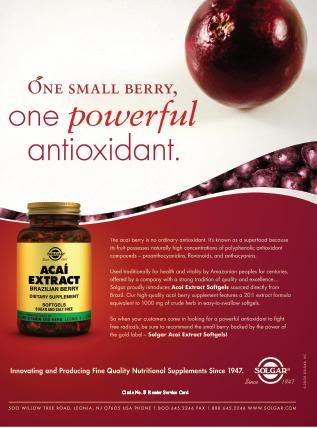 In 2008, the U.S. National Toxicology Program stated it had "some concern for effects on the brain, behavior, and prostate gland in fetuses, infants, and children at current human exposures to bisphenol A" (8). Since then, a debate has been raging about how the U.S. government can allow such substances to put youngsters at risk. A 2008 report printed in the Journal of the American Medical Association indicated that having high concentrations of BPA in the system may be related to diabetes, heart disease and liver-enzyme problems. This situation is particularly of importance to children, as their bodies are still developing and may be more vulnerable by having this substance in their systems. Nonetheless, the U.S. Food and Drug Administration continues to defend its stance that the substance is safe.
In 2008, the U.S. National Toxicology Program stated it had "some concern for effects on the brain, behavior, and prostate gland in fetuses, infants, and children at current human exposures to bisphenol A" (8). Since then, a debate has been raging about how the U.S. government can allow such substances to put youngsters at risk. A 2008 report printed in the Journal of the American Medical Association indicated that having high concentrations of BPA in the system may be related to diabetes, heart disease and liver-enzyme problems. This situation is particularly of importance to children, as their bodies are still developing and may be more vulnerable by having this substance in their systems. Nonetheless, the U.S. Food and Drug Administration continues to defend its stance that the substance is safe.Legislation is being implemented to ban the chemical, however, despite FDA's standpoint. In May 2009, Minnesota became the first state and Chicago became the first city to ban BPA. In early 2009, Suffolk County, NY also banned the chemical. Several major mainstream manufacturers (like Avent, Evenflo, Gerber and Playtex) have vowed to discontinue their use of BPA in baby bottles. Many in our industry are hopeful that federal laws will ban BPA, too. Says Sirota, "With the potential health risks caused by toxic materials, I do hope laws are put in place to prohibit the use of BPA in any and all products that are used for babies, children and adults."
Our industry has a history of supporting BPA-free bottles. One leader on this front is BornFree Inc., Boca Raton, FL. Says the company's president, Ron Vigdor, "We are delighted about the recent heightened awareness of the BPA issue. We set out from the beginning to allow parents an informed choice about what they were feeding their babies and at the same time to offer them a BPA-free alternative. Initially, despite all the scientific evidence, it was a non-issue and we had to fight numerous obstacles, legal and otherwise, just to have our message heard. Three years later, there's no question that we have been able to achieve our goals."
Others interviewed for this article whole-heartedly agree. Says Haines, "There are other safer choices out there than BPA, so let us use them."WF
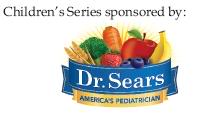 References
References1. W. Sears, M.D., and M. Sears, M.D.,www.drsears.com, accessed May 18, 2009.
2. J.C. Maroon and J. Bost, Fish Oil: The Natural Anti-Inflammatory (Basic Health Publications, Laguna Beach, CA, 2006).
3. V. Koenig, "DHA for Infants and Toddlers,"www.stonyfield.com/wellness/MooslettersDisplay.cfm?moos_id=62, accessed May 18, 2009.
4. J. Wider, "Pregnant Women in the Dark About Key Nutrients for Babies,"www.womenshealthresearch.org.
5. F. Savino et al., "Lactobacillus reuteri (American Type Culture Collection Strain 55730) Versus Simethicone in the Treatment of Infantile Colic: A Prospective Randomized Study," 119 (1). e124–e130 (2007).
6. S.K. Dash, A Consumer's Guide to Probiotics (Freedom Press, Topanga, CA, 2005).
7. gDiapers,www.gdiapers.com, accessed May 15, 2009.
8. National Institute of Environmental Health Sciences,www.niehs.nih.gov/news/media/questions/sya-bpa.cfm, accessed May 18, 2009.
Published inWholeFoods Magazine, July 2009

